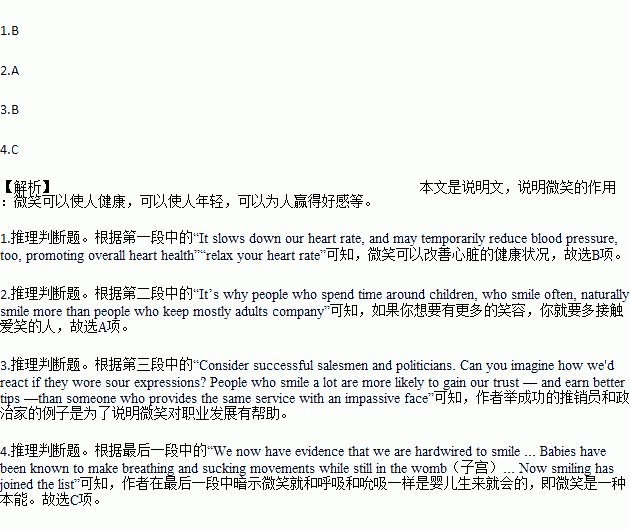题目内容
When we smile, our system recognizes that there’s an absence of threat, and relaxes: It slows down our heart rate, and may temporarily reduce blood pressure, too, promoting overall heart health. Even forcing your face into a smile can reduce stress and relax your heart rate.
Smiling is a language that everyone understands regardless of age, race, culture, language, and nationality. We all know that when you smile at people, even strangers, they almost always smile back, spreading a kind of peace and goodwill. This contagious(有感染力的)smiling comes from a subconscious tendency to match other people’s emotions. It’s why people who spend time around children,who smile often, naturally smile more than people who keep mostly adults company.
People who are generous with smiles are considered more likeable and approachable than people who wear a deadpan(面无表情的)expression. Consider successful salesmen and politicians. Can you imagine how we’d react if they wore sour expressions? People who smile a lot are more likely to gain our trust — and earn better tips — than someone who provides the same service with an impassive face.
In a study, Major League Baseball players from 1952 who wore full-faced, genuine smiles on their baseball cards lived longer, around 79.9 years, compared to players who only partly smiled or didn’t smile at all, who lived 5 to 7 years less. Smiling can make us look younger, too: People who smile frequently seem to age more slowly, appearing around three years younger than their less smiley counterparts.
We now have evidence that we are hardwired to smile. While smiling used to be considered a learned behavior that babies acquired at around six weeks of age, more advanced ultrasound testing has shown that even babies who are bom blind can smile. Babies have been known to make breathing and sucking movements while still in the womb(子宫), and these reactions are thought to prepare them for their life outside. Now smiling has joined the list. Say cheese!
1.What can smiling do according to Paragraph 1?
A. Remove your life pressure.
B. Improve the condition of the heart.
C. Make your blood pressure steady.
D. Prevent you from being absent-minded.
2.What should you do if you want to smile more according to the author?
A. Stay more with people smiling more.
B. Approach smart children.
C. Care more about others’ feelings.
D. Volunteer together with more strangers.
3.What does the author want to show by mentioning salesmen and politicians?
A. A false smile may hurt people.
B. Smiles contribute to a career.
C. Generous people tend to smile more.
D. Work pressure stops people smiling.
4.What does the author suggest in the last paragraph?
A. Babies smile within 2 months.
B. Blind babies learn to smile.
C. Smiling is a natural ability.
D. Breathing and sucking are similar to smiling.

